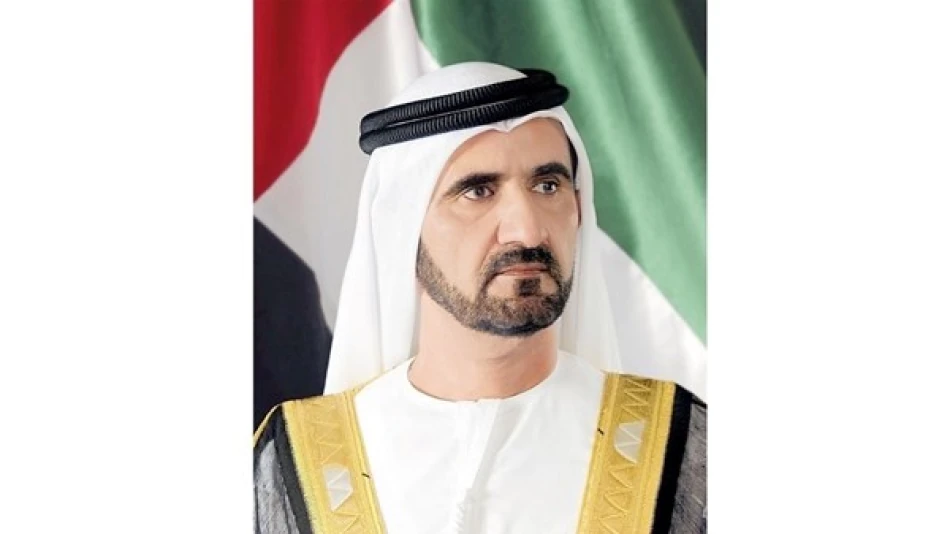
Sheikh Mohammed Honors 2025 Arab Reading Challenge Champions in Dubai
The Arab Reading Challenge, the world's largest Arabic reading competition, will crown its ninth edition champions on October 23 in Dubai. The competition drew a record 32 million students from 132,000 schools across 50 countries, showing massive growth since its launch in 2015 with just 3.6 million participants.
Sheikh Mohammed bin Rashid Al Maktoum, UAE Vice President and Prime Minister, emphasized that spreading knowledge remains a core principle for the UAE. He said the rush of millions of Arab students to read 50 books each year proves that "passion for knowledge cannot be extinguished" and that reading is "a path to restoring civilization."
The competition requires students to read and summarize 50 books throughout the school year. Winners advance through local, national, and regional levels before reaching the final ceremony at Dubai World Trade Centre.
**Record participation signals cultural shift**
This year's numbers show remarkable growth. From the first edition's 3.6 million participants, the competition has expanded by over 795%. Across nine editions, more than 163 million students have participated, with over 927,000 schools taking part and 877,000 supervisors guiding the process.
Mohammed Abdullah Al Gergawi, Secretary General of Mohammed bin Rashid Al Maktoum Global Initiatives, said the record participation reflects the UAE's commitment to developing educational and cultural realities in Arab communities. The initiative encourages students to explore world cultures while strengthening their Arabic language skills.
**Substantial prizes for winners**
The main champion receives 500,000 dirhams ($136,000), with second place earning 100,000 dirhams and third place 70,000 dirhams. The competition includes several categories: students with special needs, diaspora communities, outstanding schools, and exceptional supervisors.
For students with special needs, the top prize is 200,000 dirhams. The winning school receives 1 million dirhams, while the best supervisor gets 300,000 dirhams. These prizes represent significant investments in educational excellence across the Arab world.
**Country champions emerge from tough competition**
National winners include students from Morocco, Qatar, Saudi Arabia, Palestine, Egypt, Kuwait, and other Arab nations. The competition spans traditional Arab countries plus diaspora communities in Europe, North America, and Asia.
Schools winning the "Outstanding School" title demonstrated exceptional organization, high student participation rates, and effective programs promoting Arabic reading culture. Many integrated community events to raise awareness about the challenge.
**Nine years of growth and impact**
Previous editions show steady expansion. The eighth edition attracted 28.2 million students, while the seventh had 24.8 million participants from 46 countries. Early editions were smaller but established the foundation for this massive educational movement.
Winners from past years came from diverse backgrounds - Syria, Saudi Arabia, Palestine, Qatar, UAE, Jordan, and diaspora communities in Sweden, Belgium, and Italy. This diversity reflects the competition's broad appeal across Arab communities worldwide.
The challenge addresses a critical need in Arab education systems. By making reading competitive and rewarding, it tackles declining literacy rates and weak Arabic language skills among young people. Students must engage deeply with texts, not just read them, developing critical thinking and expression abilities.
**Educational strategy with regional implications**
The UAE positions this initiative as part of its broader soft power strategy in the Arab world. By funding and organizing the largest Arabic reading competition globally, Dubai becomes a center for educational innovation and cultural preservation.
For participating countries, the competition provides structure and incentives for improving reading programs. Schools adapt their curricula to accommodate the 50-book requirement, while governments often provide support to increase participation rates.
The emphasis on Arabic language preservation matters as English dominates global education and technology. The competition creates positive associations with Arabic reading while exposing students to diverse topics and writing styles.
The final ceremony will reveal which countries and schools achieved the highest participation rates and reading quality. These results often influence education policies and reading program funding in participating nations, making the competition a significant force in regional education development.
Most Viewed News

 Layla Al Mansoori
Layla Al Mansoori






